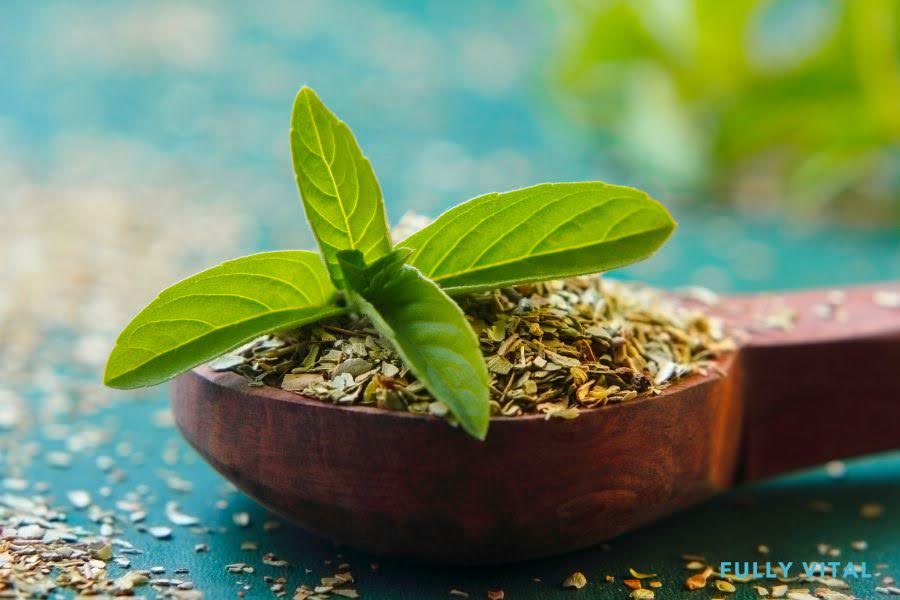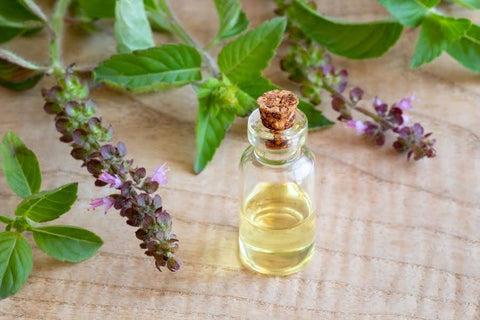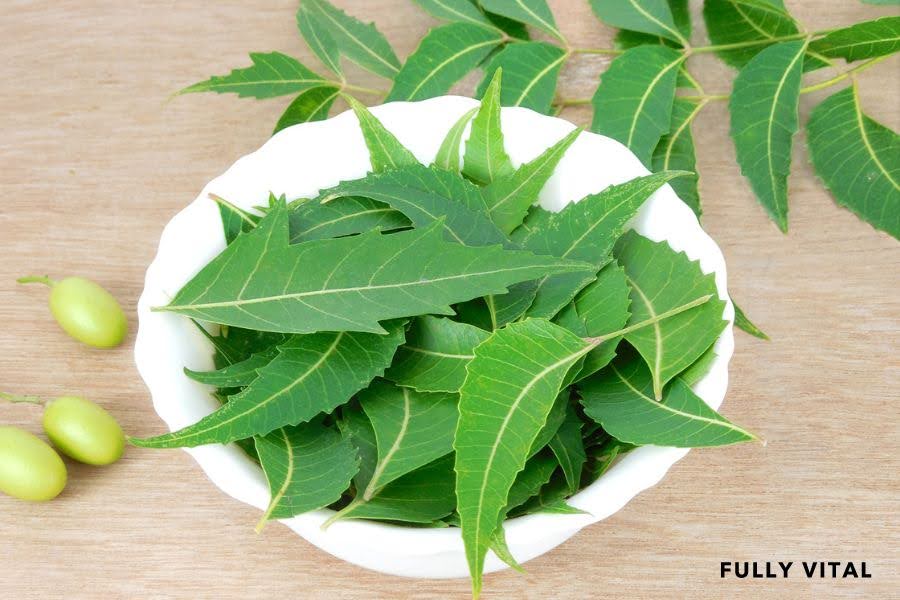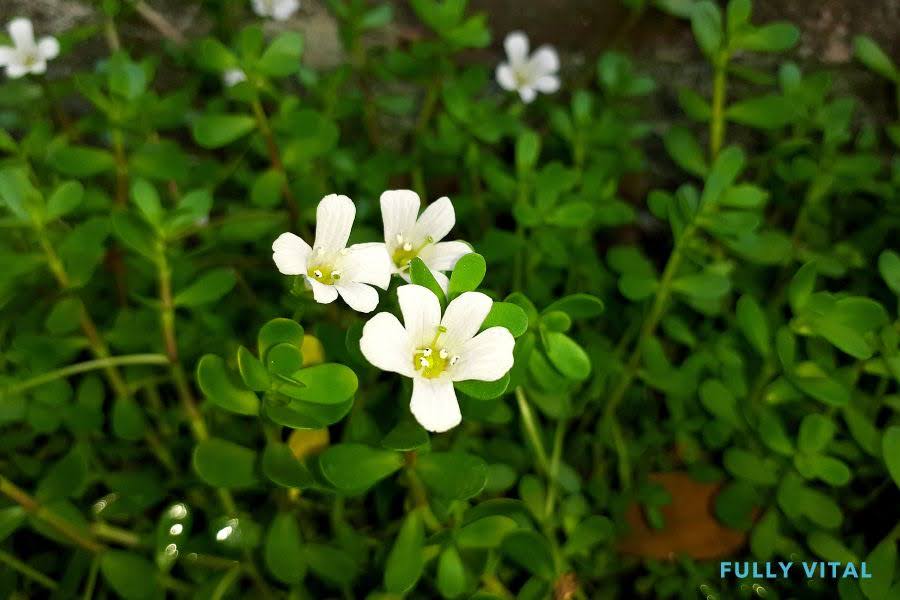
Tulsi: Holy Herb for Holistic Hair Health
In an age where chemical-laden products dominate the hair care industry, turning to nature for solutions offers a refreshing and beneficial alternative.
Tulsi, also known as Holy Basil, is renowned for its remarkable properties in promoting holistic hair health.
With its rich cultural and medicinal background, Tulsi is more than an herb; it's a symbol of health, wellness, and natural beauty.
For those seeking a product embodying these values, FullyVital's Enhance Hair Density Serum harnesses the essence of Tulsi, alongside other natural ingredients, to support hair health and density.
Whether addressing common hair problems or looking to enhance your hair care routine, incorporating Tulsi and products like Enhance Hair Density Serum can be a pivotal step towards healthier, more vibrant hair.

I LOVE MY HAIR NOW
FullyVital hair serum and hair vitamins made tremendous improvements in my hair. I truly love my hair now.
Shop Hair ProductsWhat Is Tulsi?
Tulsi, revered as a sacred herb in many cultures, is more than just a plant; it's a symbol of purity and health.
Scientifically known as Ocimum sanctum, Tulsi has been a cornerstone in Ayurvedic medicine for centuries, known for its therapeutic properties.
This herb is not only valued for its spiritual significance in rituals but also for its versatile medicinal uses.
Tulsi's distinct aroma and slightly spicy flavor make it recognizable, but it’s the herb's adaptogenic properties – helping the body adapt to stressors – that truly highlight its importance in holistic health practices, including hair care.
How Does Tulsi Benefit Hair Health?
Nourishing Scalp And Hair
Tulsi is packed with nutrients that are essential for healthy hair.
It is rich in antioxidants, vitamins A, C, and K, and minerals like calcium and magnesium, which nourish the scalp and strengthen hair follicles.
Regular use of Tulsi can help in reducing hair fall and promoting healthier hair growth.
Its antimicrobial properties also ensure a clean, dandruff-free scalp, creating an ideal environment for hair growth.
Promoting Hair Growth
Tulsi stimulates blood circulation to the scalp, which encourages hair growth.
The herb's natural oils penetrate deep into the scalp, providing nourishment to the roots.
This process not only promotes the growth of new hair but also contributes to the thickness and luster of existing hair.
For those struggling with thinning hair or slow growth, incorporating Tulsi into their hair care regime can be highly beneficial.
Addressing Scalp Conditions
The antifungal and antibacterial properties of Tulsi make it effective in treating various scalp conditions like dandruff, itchiness, and scalp infections.
Its soothing nature helps in calming inflamed and irritated skin, offering relief from conditions like psoriasis and eczema.
Regular use of Tulsi can result in a healthier scalp, paving the way for healthier hair.

What Makes Tulsi Effective For Hair Care?
Active Compounds In Tulsi
Tulsi contains several bioactive compounds, including eugenol, ursolic acid, and carvacrol, which contribute to its therapeutic properties.
These compounds have anti-inflammatory and antimicrobial effects, making Tulsi a powerful tool in combating scalp infections and irritations.
Their antioxidant properties also help in protecting hair follicles from environmental damage.
The Science Behind Its Effects
The efficacy of Tulsi in hair care is backed by science.
Its adaptogenic properties help in reducing stress, a known contributor to hair problems like premature greying and hair loss.
The antioxidants in Tulsi protect the scalp and hair from oxidative stress, while its anti-inflammatory properties reduce scalp irritation, promoting overall scalp health.
Synergy With Other Natural Ingredients
Tulsi works exceptionally well when combined with other natural ingredients like coconut oil, amla, and neem.
These combinations enhance the herb's benefits, offering comprehensive solutions for various hair issues.
For instance, Tulsi mixed with coconut oil can provide deep conditioning, while its combination with neem can intensify its anti-dandruff properties.

How Can You Use Tulsi For Hair Care?
Traditional Methods And Modern Applications
Traditionally, Tulsi has been used in various forms – from fresh leaves to powdered form.
It can be applied as a paste, infused in oils, or used as a rinse.
In modern times, Tulsi is also available in various hair care products like shampoos, conditioners, and hair masks, making it easier to incorporate into daily routines.
Diy Tulsi Hair Care Recipes
Creating DIY Tulsi hair care treatments is simple and effective.
A popular recipe is Tulsi hair oil, made by infusing Tulsi leaves in a carrier oil like coconut or olive oil.
Another is a Tulsi hair mask, made by mixing Tulsi powder with ingredients like yogurt or honey, which can be applied to the hair and scalp for deep conditioning.
Incorporating Tulsi Into Daily Hair Care
Incorporating Tulsi into daily hair care doesn't require significant changes.
Using Tulsi-infused hair care products or applying a Tulsi hair mask once a week can make a noticeable difference.
Even rinsing hair with Tulsi water after shampooing can contribute to healthier, shinier hair.
What Precautions Should Be Taken When Using Tulsi?
Potential Side Effects
While Tulsi is generally safe for topical use, it's important to be aware of potential side effects.
Some individuals may experience allergic reactions, such as itching or redness on the scalp.
It's advisable to perform a patch test before applying Tulsi-based products extensively.
Who Should Avoid Using Tulsi
Pregnant and breastfeeding women should consult a healthcare provider before using Tulsi for hair care.
People with a history of allergic reactions to herbal products should also be cautious.
Additionally, those on medication, especially blood thinners, should seek medical advice, as Tulsi can interact with certain drugs.
Best Practices For Safe Use
To safely use Tulsi for hair care, start with small applications and monitor for any adverse reactions.
Using Tulsi in its natural form, rather than in highly concentrated extracts, can minimize the risk of side effects.
It's also important to use clean, properly stored Tulsi leaves or powder to avoid contamination.
How Does Tulsi Compare With Other Natural Hair Remedies?
Tulsi Vs. Other Herbs
When compared to other herbs like Amla or Neem, Tulsi stands out for its unique combination of nourishing, antimicrobial, and stress-relieving properties.
While other herbs may excel in specific areas, Tulsi offers a more holistic approach to hair care, addressing a wide range of issues from scalp health to hair growth.
Integrating Tulsi Into A Holistic Hair Care Routine
Tulsi can be easily integrated into a holistic hair care routine that includes other natural remedies.
Its versatility allows it to be combined with various ingredients, enhancing the benefits of other herbs and natural oils.
This integrative approach can lead to a more comprehensive and effective hair care regimen.
Effectiveness In Comparison To Synthetic Products
While synthetic hair care products may offer quick results, Tulsi provides a natural, gentler alternative with fewer side effects.
The long-term use of Tulsi can lead to sustainable hair health improvements, unlike some synthetic products that may cause dependency or damage with prolonged use.
Experience The Power Of Fully Vital Hair Growth ProductsDiscover the key features and benefits of our science-backed hair growth products:
Take the next step in achieving healthier, more vibrant hair with Fully Vital. Start experiencing the benefits of our hair growth products and regain control of your hair's aging process. |
Final Thoughts On Tulsi
Embracing Tulsi in your hair care routine is not just about using a natural remedy; it's about adopting a holistic approach to health and beauty.
Its rich history, combined with scientific backing, makes Tulsi a compelling choice for those seeking natural solutions to hair care problems.
For those looking to incorporate Tulsi into their regimen conveniently, the Enhance Hair Serum (3-Pack) from Fully Vital offers a blend of natural ingredients, including the benefits of Tulsi, to tackle hair fall, scalp issues, and improve overall hair health.
This serum is an example of how modern products can integrate traditional herbs like Tulsi into effective hair care solutions.
Remember, using natural remedies like Tulsi, especially in balanced, thoughtfully formulated products, is key to maintaining overall hair and scalp health.
Check out our recent blogs:
- From Runway To Reality: How To Nail The Layered Bob With Bangs
- Micro Bangs 101: Everything You Need To Know Before Getting Them
- Long Curtain Bangs: The Perfect Hairstyle For Women Of All Hair Types
Frequently Asked Questions About Tulsi
Can Tulsi help with hair loss?
Yes, Tulsi can help with hair loss.
It strengthens hair follicles and improves blood circulation to the scalp, which can promote hair growth and reduce hair fall.
Is Tulsi suitable for all hair types?
Tulsi is generally suitable for all hair types.
However, individual results may vary, and it's important to use it according to your specific hair type and needs.
Can Tulsi cure scalp infections?
Tulsi has antimicrobial properties that can help in treating scalp infections.
However, for severe infections, it's advisable to consult a healthcare professional.
How often should I use Tulsi for hair care?
Using Tulsi once or twice a week is generally sufficient.
Overuse may lead to scalp dryness or irritation in some individuals.
Can Tulsi help with dandruff?
Yes, Tulsi's antifungal properties make it effective in combating dandruff.
Regular use can help maintain a clean and healthy scalp.
Are there any age restrictions for using Tulsi in hair care?
There are no specific age restrictions for using Tulsi in hair care.
However, it is always advisable for minors or elderly individuals to consult with a healthcare provider before use.
Can Tulsi change the color of my hair?
Tulsi does not have properties that change hair color.
It is primarily used for scalp and hair health.
How long does it take to see results from using Tulsi?
Results vary depending on the individual and the condition being treated.
Consistent use over several weeks is usually required to see noticeable improvements.
Can I use Tulsi if I have colored hair?
Tulsi is generally safe for colored hair, but it's advisable to do a patch test to ensure it doesn’t affect the color.
Is it better to use fresh Tulsi leaves or powdered Tulsi?
Both fresh leaves and powdered Tulsi are effective.
The choice depends on availability and personal preference.
Sources:
- Cohen, M. M. (2014). Tulsi - Ocimum sanctum: A herb for all reasons. The Journal of Ayurveda and Integrative Medicine, 5(4), 251–259. https://doi.org/10.4103/0975-9476.146554
- Jamshidi, N., & Cohen, M. M. (2017). The Clinical Efficacy and Safety of Tulsi in Humans: A Systematic Review of the Literature. Evidence-Based Complementary and Alternative Medicine, 2017, 9217567. https://doi.org/10.1155/2017/9217567
- Suanarunsawat, T., et al. (2009). Anti-oxidative and hypolipidemic effects of Ocimum sanctum Linn. leaves in diabetic rats. Journal of Clinical Biochemistry and Nutrition, 44(2), 123–129. https://doi.org/10.3164/jcbn.08-220
- Pattanayak, P., et al. (2010). Ocimum sanctum Linn. A reservoir plant for therapeutic applications: An overview. Pharmacognosy Reviews, 4(7), 95–105. https://www.ncbi.nlm.nih.gov/pmc/articles/PMC3249919/
- Gupta, S., et al. (2002). Therapeutic uses of Ocimum sanctum Linn (Tulsi) with a note on eugenol and its pharmacological actions: a short review. Indian Journal of Physiology and Pharmacology, 46(2), 125–131. https://www.researchgate.net/publication/11205766
- Mondal, S., et al. (2011). Double-blinded randomized controlled trial for immunomodulatory effects of Tulsi (Ocimum sanctum Linn.) leaf extract on healthy volunteers. Journal of Ethnopharmacology, 136(3), 452–456. https://doi.org/10.1016/j.jep.2011.05.012
- Kothari, S., et al. (2011). Efficacy of Ocimum sanctum in the treatment of dandruff: A double-blind controlled study. Indian Journal of Dermatology, 56(1), 30–32. https://doi.org/10.4103/0019-5154.77549
- Singh, S., & Majumdar, D. K. (1999). Evaluation of the gastric antiulcer activity of fixed oil of Ocimum sanctum (Holy Basil). Journal of Ethnopharmacology, 65(1), 13–19. https://doi.org/10.1016/s0378-8741(98)00136-8
- Prakash, P., & Gupta, N. (2005). Therapeutic uses of Ocimum sanctum linn (Tulsi) with a note on eugenol and its pharmacological actions: a short review. Indian Journal of Physiology and Pharmacology, 49(2), 125–131. https://www.researchgate.net/publication/7756273
- Baliga, M. S., et al. (2013). Ocimum sanctum L (Holy Basil or Tulsi) and its phytochemicals in the prevention and treatment of cancer. Nutrition and Cancer, 65 Suppl 1, 26–35. https://doi.org/10.1080/01635581.2013.785003








